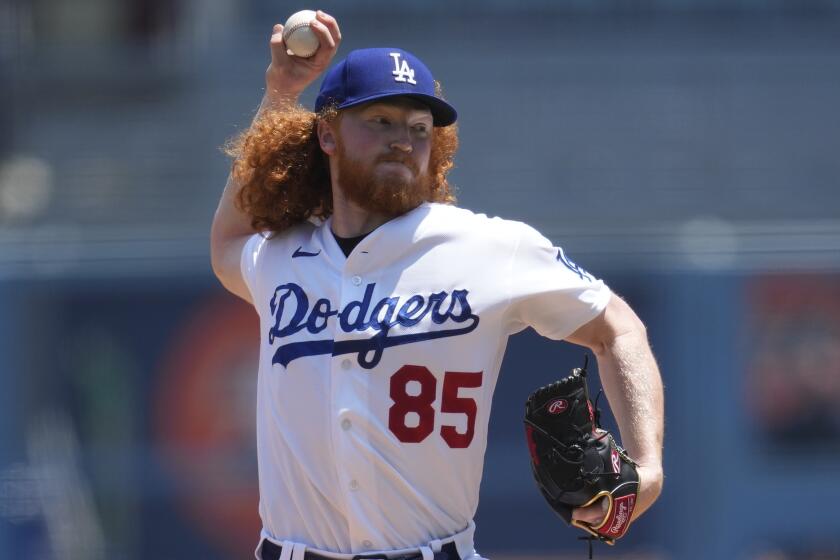Column: Dodgers’ pursuit of Blake Snell shows how Shohei Ohtani is a change agent

- Share via
The degree to which Shohei Ohtani has transformed the Dodgers was revealed in greater detail on Tuesday.
By agreeing to a five-year, $182-million contract with two-time Cy Young Award winner Blake Snell, the Dodgers signaled their intentions to the baseball world.
They’re building the sport’s next dynasty.
The financial considerations that previously kept the Dodgers from pushing all-in on an annual basis suddenly feel as if they’re behind them, and the defending World Series champions now have a legitimate front-line starter in Snell to complement a historically dangerous lineup featuring Ohtani, Mookie Betts and Freddie Freeman.
The Dodgers made a major move Tuesday night, agreeing to a five-year, $182-million contract with two-time Cy Young Award winning pitcher Blake Snell.
Stacked rosters don’t guarantee championships, but they certainly improve the chances of winning them, and not since the New York Yankees of the late 1990s and early 2000s has a franchise been as well positioned to win title after title after title.
Ohtani was the primary agent of change.
In addition to his unprecedented on-field performance, Ohtani has gifted the Dodgers a level of financial flexibility the already-wealthy franchise had never previously experienced.
When Ohtani signed, he asked the team to defer $680 million of the $700 million he would be owed over the 10 years of his contract.
“That was what Shohei did to help us be able to make sure we could put the best team around him on the field,” team owner Mark Walter said last month.
Almost a year after Yoshinobu Yamamoto received a $50-million signing bonus, Snell will be paid $52 million up front, so long as the left-hander completes a physical examination to finalize his contract.
Walker Buehler, who got a save for the Dodgers in Game 5 of the World Series, will sign with the Red Sox. L.A. locks up Teoscar Hernández while aiming for Rōki Sasaki.
Between the deferrals on Ohtani’s contract and the revenue generated by baseball’s only two-way player, the Dodgers have plenty of cash on hand.
Last offseason, the money saved on Ohtani was used to sign right-hander Tyler Glasnow to a $136.5-million extension after he was acquired from the Tampa Bay Rays. The Dodgers also signed fellow right-hander Yamamoto to a $325-million deal and picked up outfielder Teoscar Hernández for $23.5 million.
Dodgers co-owner Todd Boehly said last month of Ohtani: “He wants to be the most amazing baseball player in the history of the world. How do you do that? You win World Series. And how do you win World Series? You help figure out how to make the club that much better. He made the club that much better when he came to that decision.”
This winter, the Dodgers could have wagered the upcoming season on Ohtani’s return to the mound and the possible (but not guaranteed) addition of 23-year-old Japanese fireballer Roki Sasaki, but they instead agreed to sign Snell to the third-most lucrative deal ever awarded to a left-handed pitcher.
The Dodgers could have signed Snell to a similar deal when he was a free agent last year, only to settle for a more cost-effective option in Glasnow. Their more assertive approach with Snell this time around points to a general shift in the team’s mindset.
Dodgers pitchers Dustin May and Tony Gonsolin, who missed this past season because of injuries, agreed to contracts for next season to avoid arbitration.
Considering how many $300-million teams they have fielded, the Dodgers have been extremely disciplined spenders. The terms for Betts’, Freeman’s and Trevor Bauer’s deals were favorable to the team. In notable trades for players such as Max Scherzer, Trea Turner, Manny Machado and Yu Darvish, the Dodgers were beneficiaries of salary dumps.
The strategy kept the Dodgers from making any crippling mistakes but also placed them at the mercy of market conditions. When lopsided deals failed to emerge, they often did little to improve their teams. How many championships were lost because of that?
Now, instead of allowing the market to dictate what they can and can’t do, the Dodgers are dictating the market. At this point, who’s to say they won’t sign Juan Soto?
President of baseball operations Andrew Friedman has called the team’s 13 seasons under Guggenheim Baseball Management the “golden era of Dodgers baseball,” but that golden era might have just only started.
More to Read
Are you a true-blue fan?
Get our Dodgers Dugout newsletter for insights, news and much more.
You may occasionally receive promotional content from the Los Angeles Times.











